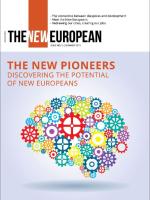Untapped potential or unfounded preferential treatment?
Since the 2000s diaspora organisations have emerged as actors in the migration-development nexus. In contrast to the private and often family-based nature of remittances, collective remittances from diaspora organisations generally focus on the local community or are intended to benefit broader parts of the population through support to infrastructure, social service provision or civil society. Likewise diaspora organisations are sometimes perceived to constitute linkages between Western societies and their homelands in some development.
In an article the magazine The New European, DIIS senior researcher Nauja Kleist examines how North West European development aid agencies support the development activities of diaspora organisations, especially in fragile situations. The article examines the perceived relationship between diaspora involvement and development, and how this perception is reflected in the ways in which development agencies collaborate with diaspora organisations through respectively mainstream funding schemes, special diaspora initiatives and network support. Three kinds of diaspora support initiatives are identified: general NGO support funding schemes, special diaspora initiatives and network support. Finally Kleist touches upon the question if diaspora support constitutes an untapped potential for development aid agencies or unfounded preferential treatment, concluding that the jury is still out.
A longer version of the article was published in the journal New Diversities in 2014 in a special issue on the role of migration in the Post-2015 Development Agenda
DIIS Experts


